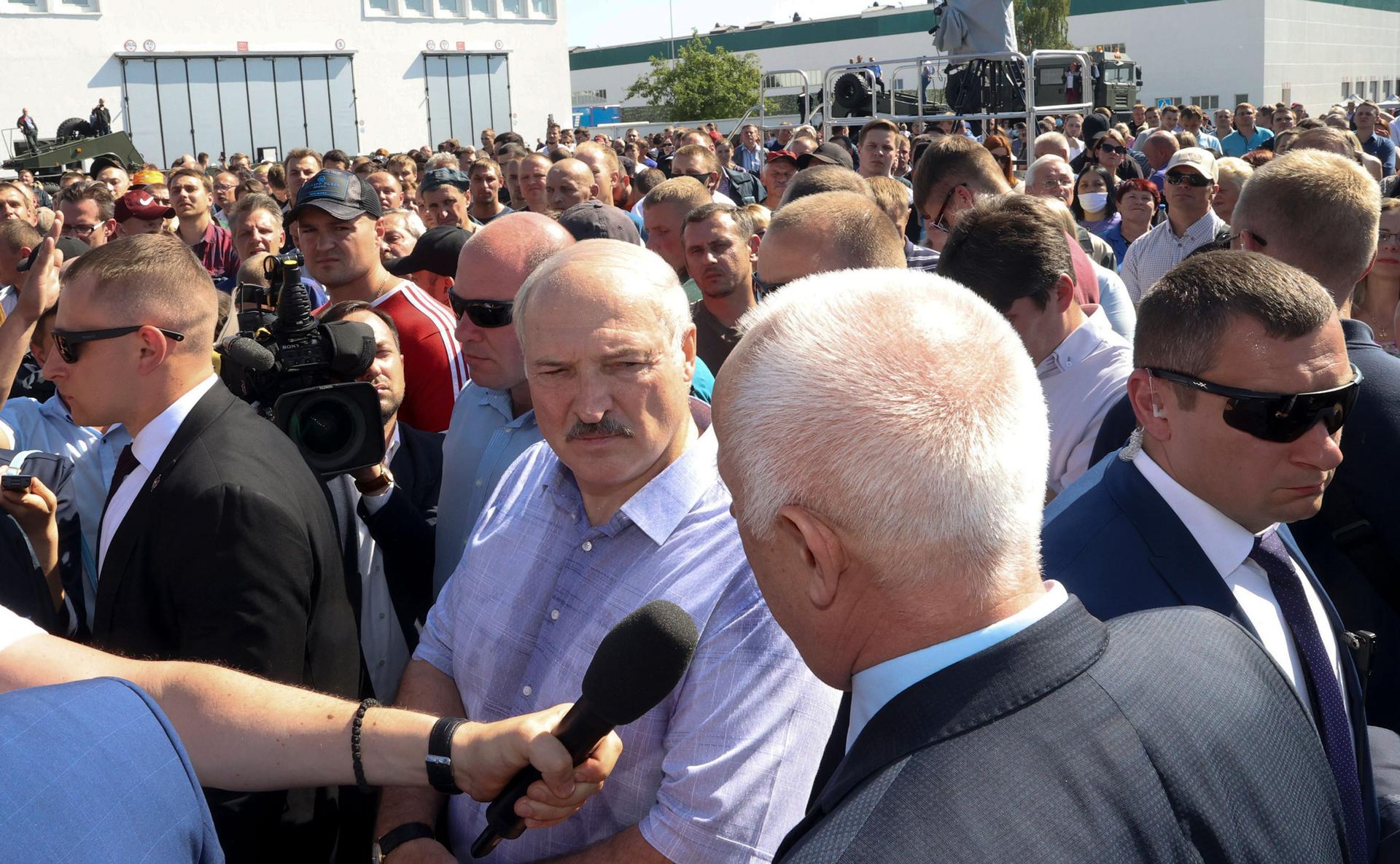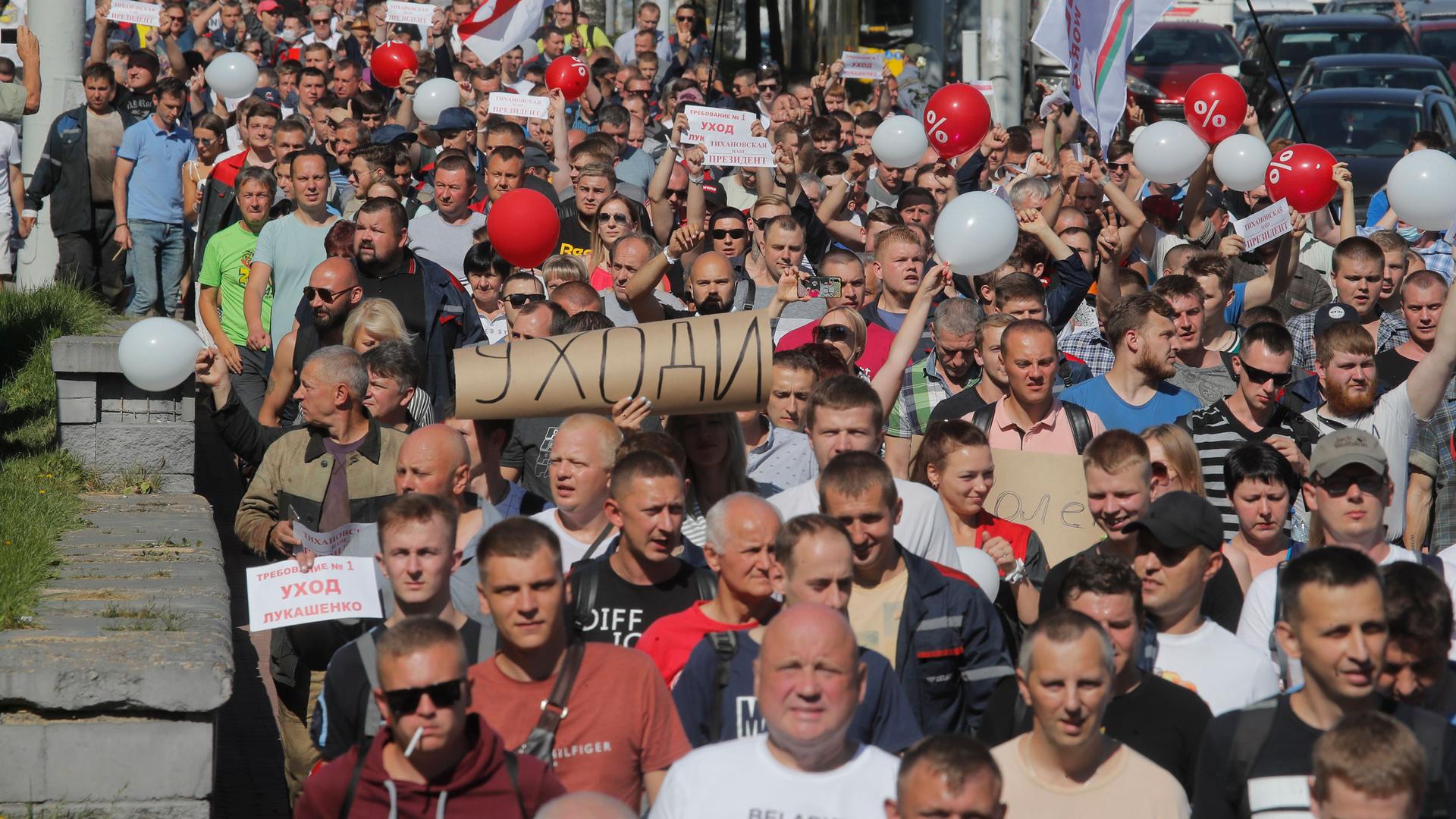Belarus workers on the streets as EU chief calls summit
Workers with handmade posters reading “Go away!” march toward the Minsk Wheel Tractor Plant where Belarusian President Alexander Lukashenko addresses employees in Minsk, Belarus, Monday, Aug. 17, 2020.
On the ninth straight day of protests against the official results of the Aug. 9 presidential vote, authoritarian President Alexander Lukashenko flew by helicopter to a factory in the capital in a bid to rally support but was heckled by thousands of workers chanting “Go away!”
Facing the angry crowd, the 65-year-old former state farm director dismissed the calls to step down amid a wave of strikes declared by numerous state-controlled factories.
“I will never cave in to pressure,” Lukashenko told the workers, saying those who intend to go on strike could leave if they want. “Some of you might have got the impression that the government no longer exists, that it has tumbled down. The government will never collapse, you know me well.”
“There will be no new election until you kill me,” he said, charging that the protests are ruining the economy and warning that the country will collapse if he steps down. He vowed to resist pressure from the demonstrators, who he said have been “poisoned by social networks,” but suggested that he’s open for discussions on constitutional reforms in an apparent bid to stem the tide of protests.
As he spoke, over 5,000 striking workers from the Minsk Tractor Plant marched down the streets of the city, demanding that Lukashenko cede his post to Sviatlana Tsikhanouskaya, the leading opposition candidate.
“Lukashenko is a former president. He needs to go,” said Sergei Dylevsky, the leader of the protest at the Minsk Tractor Plant, adding that Tsikhanouskaya is “our president, legitimate and elected by the people.”
Dylevsky voiced concern that Lukashenko’s calls with Russian President Vladimir Putin could herald an attempt by the country’s giant eastern neighbor to send in troops to prop up Lukashenko.
“We don’t want that, and we won’t let that happen,” he said.

Lukashenko spoke twice with Putin over the weekend and reported that the Russian leader said Moscow stands ready to provide support in the face of what he described as foreign aggression. He claimed that NATO nations are beefing up military forces on the border with Belarus, a claim the alliance rejected.
Lithuania also warned about worrying signs that Russia might be planning to use the situation to take over Belarus.
Alexander Klaskovsky, an independent Minsk-based political analyst, said that the calls with Putin reflect that the Kremlin is considering propping up Lukashenko in exchange for his consent for a closer union between the two nations, which he had resisted in the past.
“Russian understands Lukashenko’s weakness and is preparing its own scenario, which could envisage a deep integration in exchange for military help,” Klaskovsky said.
Related: Opposition figure calls for ‘new, democratic, open country called Belarus’
The official results of the Aug. 9 vote gave Lukashenko 80% of the votes and Tsikhanouskaya only 10%, but the opposition claimed the vote was rigged. Tsikhanouskaya has said protocols from precincts around the country showed her winning 60-70% of the vote.
The 37-year-old former teacher left for neighboring Lithuania last week under what her associates described as pressure from law enforcement officials. Her husband, an opposition blogger, whom she replaced on the ballot, has been in jail since May.
In a video statement released Monday, Tsikhanouskaya said she was ready to step in as the country’s new leader. “I’m ready to take on the responsibility and act as a national leader in order for the country to calm down, return to its normal rhythm, in order for us to free all the political prisoners and prepare legislation and conditions for organizing new presidential elections,” she said.
A ferocious crackdown on protesters in the wake of Sunday’s vote has left nearly 7,000 people detained and hundreds injured, as police dispersed the crowds of peaceful demonstrators with stun grenades, rubber bullets and clubs. The brutal and indiscriminate action provoked widespread anger, forcing the authorities to back off, and police have stood back since Thursday, letting protests go uninterrupted.
Big crowds turned out Saturday to pay their last respect to Alexander Taraikovsky, a protester who died Monday. The authorities initially claimed that he died when an explosive device he intended to throw at police blew up in his hands, but a video shot by an Associated Press journalist showed that he had no explosive device when he fell on the ground, his shirt bloodied. His partner said his body had a perforation in his chest that she believes was a bullet wound.
Belarus’ Interior Minister has stepped back from the official version, saying Sunday that Taraikovsky might have been killed by a rubber bullet.
On Sunday, an estimated 200,000 people filled the central Independence Square and nearby avenues in the largest protest the country has ever seen.
In Brussels, European Council President Charles Michel convened an emergency summit of EU leaders on Wednesday to discuss the handling of the election and the crackdown in the wake of the polls.
“The people of Belarus have the right to decide on their future and freely elect their leader,” Michel said in a tweet. “Violence against protesters is unacceptable and cannot be allowed.”
On Friday, the 27 EU foreign ministers underlined that the elections were neither free nor fair and decided to start drawing up a list of people who could face sanctions over their role in the violence.
German President Frank-Walter Steinmeier urged Lukashenko Monday to “follow the path of talks, not to rely on violence but on dialogue.”
“I appeal to the Belarusian military not to sin by using violence against their own people,” he said.
By Yuras Karmanau/AP
Our coverage reaches millions each week, but only a small fraction of listeners contribute to sustain our program. We still need 224 more people to donate $100 or $10/monthly to unlock our $67,000 match. Will you help us get there today?
